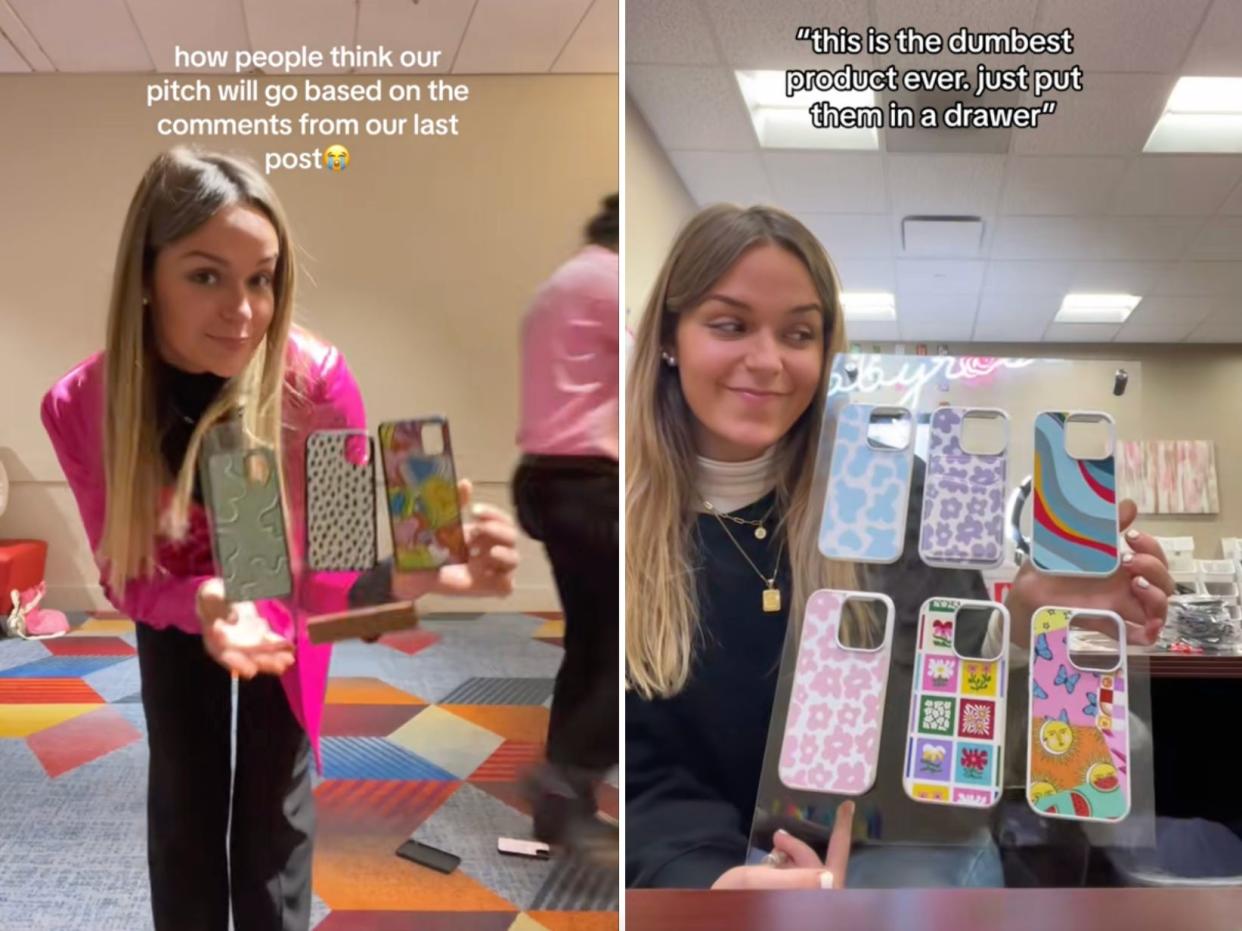A 21-year-old went viral at a 'Shark Tank' casting call for her phone case organizer that viewers called dumb — but here's why she's doubling down

21-year-old college senior Abby Rosilier made several TikToks at a "Shark Tank" casting call in Vegas.
Her product — an acrylic sheet to store and display smartphone cases — was met with derision.
Rosilier, who started a phone case company at 16, defended the concept and her credentials.
A college senior and burgeoning entrepreneur named Abby Rosilier filmed a TikTok the day before attending the Las Vegas casting call for the show "Shark Tank." Before discovering if she and her product made the show, she's already received a barrage of feedback on her pitch online. And it was not good.
But while many viewers criticized her invention — a sheet of acrylic adorned with custom hooks where customers can store and display their smartphone cases — Rosilier is doubling down.
The entrepreneur, who is 21, said the backlash has been deeply upsetting, but added that many viewers might not be aware of her existing phone case company, Abby Rose, that took off during the pandemic. She told BI she founded it at age 16 out of her parents' garage in San Antonio, Texas, and it's become so successful, that various family members have since gotten involved.
The family business sold 14,607 cases last year, Rosilier said on TikTok — which she told BI was "actually our lowest year."
The storage product, tentatively dubbed the RoseRack, is a natural extension of that business — though she doesn't expect it to be available until later this year.
Ultimately, despite the social media hate, Rosilier is grateful for the viral exposure, adding that the tide has started to turn after she provided some context for why she created the product.
'I have never had that level of hate,' Rosilier said
On January 12, Rosilier posted to TikTok the day before the casting call, filming her 26-year-old brother, Zach, who works at Abby Rose and spearheaded the development of the RoseRack. Zach showed viewers the variety of phone case organizer sheets they designed.
She said it had been three years in the making, billing it as the "world's first phone case organizer."
"We were pitching the Rack, but selling part of Abby Rose too with it," Rosilier told BI of the "Shark Tank" pitch. (She added that she'll know if she's cast on the show by this month's end.)
Commenters weren't convinced. "It's a no from me babes," one person wrote. "3 years for acrylic vinyl," another snarked.
Negative comments were flooding in moments before she was about to make the pitch, as her mom urged her to get off her phone. Nevertheless, Rosilier told BI she and her brother "did so good" when it came time to present.
Viewers, on the other hand, said the RoseRack looked like cheap plastic and likened the concept to displaying rolls of toilet paper on a wall, Rosilier recounted on TikTok. They called the idea dumb and said she was seeking to answer a problem no one actually struggled with. Others said they wanted to see her make a fool out of herself on national television.
"I have never had that level of hate on my business account ever," Rosilier told BI. In time, the criticism "started to get more personal," she said, with people calling her "delusional and "not a real entrepreneur."
Ultimately, she returned to TikTok last week to defend the venture and her credentials in a response with 1.2 million views.
The RoseRack needed a $20,000 investment to develop, she said, that was largely used for the design of the hooks that could fit a variety of phone cases. She likened the product to a jewelry rack and said that a survey of Abby Rose customers revealed most owned more than one case.
She also clarified that her target consumer is Gen Z — to whom changing phone cases is "the same as putting on a different pair of earrings every day," Rosilier told BI. (She said she switches hers once every few weeks.)
And while the response continues to be divided, Rosilier stands by the product. She's also seeing a tide shift in her favor.
"The more I explained the product, the more people are understanding," she said. "Once you put it out on the market, that's when the real answer comes."
Read the original article on Business Insider


